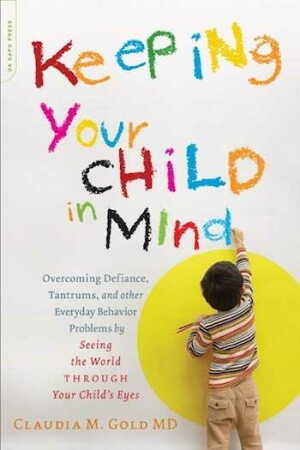Keeping Your Child in Mind
Overcoming Defiance, Tantrums, and Other Everyday Behavior Problems by Seeing the World Through Your Child’s Eyes
Claudia M. Gold
Being understood by someone you love is one of the most powerful feelings, for adults and children alike. For young children, it is the most important of all experiences for it allows their minds and sense of themselves to grow.
In the midst of the perennial problems parents bring to her, when both parent and child can be “at their worst,” Dr Gold shows the magical effect of wondering about the meaning of a child’s behavior. Unlike other books of advice which show a parent what to do, Keeping Your Child in Mind shows how to be with a child. Crises – from colic and sleep issues to oppositional behavior and separation anxieties are defused when children feel truly heard and validated by their parents. In this way, they learn to understandthemselvesand manage difficult feelings on their own
In her short, insightful guide, backed by new research in developmental psychologyand attachment theory, and vivid stories from her practice that all parents will recognize, Dr. Gold shows parents how to keep a child’s perspective in mind and deepen this central relationship in their lives.
Published by Da Capo Press
Praise for Keeping Your Child in Mind
Gold, a behavioral pediatrician in Great Barrington, Mass., and Boston Globe columnist on children’s mental health, focuses not on what to do but “how to be” with a child. … readers seeking a comprehensive approach to child-rearing will welcome this thoughtful book.
— Publishers Weekly
Would be especially useful for new parents in search of holistic guidance. A panoply of hypothetical situations offering broad-based solutions.
— Kirkus
The book looks at various ages and stages of development, imparting excellent advice that will make the job of parenting much easier.
— Bookviews
Finally, a book for parents that explains as well as advises, that reaches out but doesn’t patronise. It strikes at the core of what being a parent means – to recognise your child as a person with thoughts and feelings. The advice in this book is born not just of decades of experience and the best of modern developmental science, but also of the author’s deep humanity and the genuine understanding of both the child’s and the parent’s perspective. It is a truly magnificent achievement of sense and sensibility. I wish I had it when my children were younger.
— Peter Fonagy, Ph.D. Freud Memorial Professor of Psychoanalysis, University College London and Chief Executive of the Anna Freud Centre.
